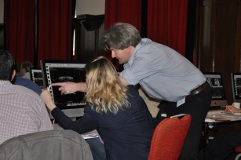Pelican no longer funds research into prostate cancer.
Over the last 20 years, the use of Magnetic Resonance Imaging (MRI) has dramatically increased in all areas of medicine. MRI is a unique imaging modality providing a non-invasive method of acquiring clinical imaging information without exposing patients to potentially harmful ionizing radiation.
For prostate cancer, MRI is traditionally used AFTER biopsy. The theory being that a transanal ultrasound (TRUS) is used to guide the biopsy to the gland and then the histopathology will demonstrate if any tumour is present. However, the biopsy often makes images inside the gland unreadable. This is because the biopsy needles damage the tissues of the prostate gland and create ‘artefact’, meaning that MRI cannot read any information within the gland.
Pelican is interested in research that investigates the use of MRI BEFORE biopsy that can image the gland for significant, clinically-important cancer. There is an increasing belief amongst a number of clinicians that this is possible, but further research is necessary to find a modality that can provide sufficient clarity and information.
Pelican has previous experience of the importance of MRI, and also the challenges of finding an effective modality and convincing clinicians of its value. Professor Gina Brown has developed a method of using MRI to assist in clinical decision-making for bowel cancer treatment. Fifteen years ago there was extensive cynicism about the use of MRI for bowel cancer – it is now mandatory for all bowel cancer patients.
At present, the role of imaging is to determine the stage of the prostate cancer, specifically whether or not the disease extends beyond the prostate gland. There is no established imaging technique that provides information about the likely biological behaviour of the disease.
Dr Clare Allen and Dr Alex Kirkham at University College London Hospital (UCLH) have successfully developed protocols to identify malignant tumours within the prostate gland using MRI. They use different modalities of MRI to produce the best anatomical data. The aim of the research is to evaluate if any MRI can be of use in predicting the future biological behaviour of the early prostate cancer.
and Dr Alex Kirkham at University College London Hospital (UCLH) have successfully developed protocols to identify malignant tumours within the prostate gland using MRI. They use different modalities of MRI to produce the best anatomical data. The aim of the research is to evaluate if any MRI can be of use in predicting the future biological behaviour of the early prostate cancer.
MRI scans also allow the whole of the prostate to be examined. Previously, urologists believed that there were few tumours in the ‘front’ (anterior) of the prostate gland. This was because a 12 needle biopsy cannot reach this area. MRI and prostate mapping biopsies allow a thorough investigation of the whole prostate and precise treatment.
In addition to supporting research in this area – Pelican Cancer Foundation has also organised a series of Prostate Cancer Colloquiums where leading medical professionals can meet and discuss recent research into the various imaging techniques and their consequences for prostate cancer treatment.
